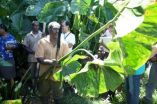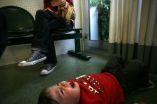(Press-News.org)
INFORMATION:
The Global Crop Diversity Trust (www.croptrust.org)
The mission of the Trust is to ensure the conservation and availability of crop diversity for food security worldwide. Although crop diversity is fundamental to fighting hunger and to the very future of agriculture, funding is unreliable and diversity is being lost. The Trust is the only organization working worldwide to solve this problem. The Trust is providing support for the ongoing operations of the seed vault, as well as organizing and funding the preparation and shipment of seeds from developing countries to the facility.
Efforts underway to rescue vulnerable bananas, giant swamp taro, other Pacific Island crops
Saving vulnerable indigenous crop diversity is key to developing crops in the future and promoting healthier diets
2010-10-22
ELSE PRESS RELEASES FROM THIS DATE:
Nightshades' mating habits strike uneasy evolutionary balance
2010-10-22
Most flowering plants, equipped with both male and female sex organs, can fertilize themselves and procreate without the aid of a mate. But this may only present a short-term adaptive benefit, according to a team of researchers led by two University of Illinois at Chicago biologists, who report that long-term evolutionary survival of a species favors flowers that welcome pollen from another plant.
"We've shown that a strong, short-term advantage experienced by individuals that have sex with themselves can be offset by long-term advantages to plant species that strictly ...
Malarial mosquitoes are evolving into new species, say researchers
2010-10-22
Two strains of the type of mosquito responsible for the majority of malaria transmission in Africa have evolved such substantial genetic differences that they are becoming different species, according to researchers behind two new studies published today in the journal Science.
Over 200 million people globally are infected with malaria, according to the World Health Organisation, and the majority of these people are in Africa. Malaria kills one child every 30 seconds.
Today's international research effort, co-led by scientists from Imperial College London, looks at ...
ESHRE publishes new PGD guidelines
2010-10-22
The four guidelines include one outlining the organisation of a PGD centre and three relating to the methods used: amplification-based testing, fluorescence in situ hybridisation (FISH)-based testing and polar body/embryo biopsy.
"The guidelines are a detailed update to the Consortium's initial PGD guidelines, published in the same journal in 2005. They have been developed as a set which, taken together, form a complete best-practice compendium," said Gary Harton, chairman of ESHRE's PGD Consortium and Head of Molecular Genetics at Reprogenetics in Livingston, New Jersey.
The ...
Forensic scientists use postmortem imaging-guided biopsy to determine natural causes of death
2010-10-22
Researchers found that the combination of computed tomography (CT), postmortem CT angiography (CTA) and biopsy can serve as a minimally invasive option for determining natural causes of death such as cardiac arrest, according to a study in the November issue of the American Journal of Roentgenology (www.ajronline.org).
In the last decade, postmortem imaging, especially CT, has gained increasing acceptance in the forensic field. However, CT has certain limitations in the assessment of natural death.
"Vascular and organ pathologic abnormalities, for example, generally ...
Peripheral induction of Alzheimer's-like brain pathology in mice
2010-10-22
Pathological protein deposits linked to Alzheimer's disease and cerebral amyloid angiopathy can be triggered not only by the administration of pathogenic misfolded protein fragments directly into the brain but also by peripheral administration outside the brain. This is shown in a new study done by researchers at the Hertie Institute of Clinical Brain Research (HIH, University Hospital Tübingen, University of Tübingen) and the German Center for Neurodegenerative Diseases (DZNE), to be published in Science on October 21, 2010.
Alzheimer's disease and a brain vascular ...
The sound of the underground! New acoustic early warning system for landslide prediction
2010-10-22
A new type of sound sensor system has been developed to predict the likelihood of a landslide.
Thought to be the first system of its kind in the world, it works by measuring and analysing the acoustic behaviour of soil to establish when a landslide is imminent so preventative action can be taken.
Noise created by movement under the surface builds to a crescendo as the slope becomes unstable and so gauging the increased rate of generated sound enables accurate prediction of a catastrophic soil collapse.
The technique has been developed by researchers at Loughborough ...
Malaria research begins to bite
2010-10-22
Scientists at The University of Nottingham and the Wellcome Trust Sanger Institute near Cambridge have pin-pointed the 72 molecular switches that control the three key stages in the life cycle of the malaria parasite and have discovered that over a third of these switches can be disrupted in some way.
Their research which has been funded by Wellcome Trust and the Medical Research Council (MRC) is a significant breakthrough in the search for cheap and effective vaccines and drugs to stop the transmission of a disease which kills up to a million children a year.
Until ...
Value-added sulfur scrubbing
2010-10-22
Power plants that burn fossil fuels remain the main source of electricity generation across the globe. Modern power plants have scrubbers to remove sulfur compounds from their flue gases, which has helped reduce the problem of acid rain. Now, researchers in India have devised a way to convert the waste material produced by the scrubbing process into value-added products. They describe details in the International Journal of Environment and Pollution.
Fossil fuels contain sulfur compounds that are released as sulfur dioxide during combustion. As such, flue gas desulfurisation ...
Authoritarian behavior leads to insecure people
2010-10-22
Researchers from the University of Valencia (UV) have identified the effects of the way parents bring up their children on social structure in Spain. Their conclusions show that punishment, deprivation and strict rules impact on a family's self esteem.
"The objective was to analyse which style of parental socialisation is ideal in Spain by measuring the psychosocial adjustment of children", Fernando García, co-author of the study and a researcher at the UV, tells SINC.
The study, which has been published in the latest issue of the journal Infancia y Aprendizaje, was ...
Adverse neighborhood conditions greatly aggravate mobility problems from diabetes
2010-10-22
INDIANAPOLIS – A study published earlier this year in the peer reviewed online journal BMC Public Health has found that residing in a neighborhood with adverse living conditions such as low air quality, loud traffic or industrial noise, or poorly maintained streets, sidewalks and yards, makes mobility problems much more likely in late middle-aged African Americans with diabetes.
"We followed a large group of African Americans for 3 years and found an extremely strong correlation between diabetes and adverse neighborhood conditions. The study participants were between ...
LAST 30 PRESS RELEASES:
Scientists discover why we know when to stop scratching an itch
A hidden reason inner ear cells die – and what it means for preventing hearing loss
Researchers discover how tuberculosis bacteria use a “stealth” mechanism to evade the immune system
New microscopy technique lets scientists see cells in unprecedented detail and color
Sometimes less is more: Scientists rethink how to pack medicine into tiny delivery capsules
Scientists build low-cost microscope to study living cells in zero gravity
The Biophysical Journal names Denis V. Titov the 2025 Paper of the Year-Early Career Investigator awardee
Scientists show how your body senses cold—and why menthol feels cool
Scientists deliver new molecule for getting DNA into cells
Study reveals insights about brain regions linked to OCD, informing potential treatments
Does ocean saltiness influence El Niño?
2026 Young Investigators: ONR celebrates new talent tackling warfighter challenges
Genetics help explain who gets the ‘telltale tingle’ from music, art and literature
Many Americans misunderstand medical aid in dying laws
Researchers publish landmark infectious disease study in ‘Science’
New NSF award supports innovative role-playing game approach to strengthening research security in academia
Kumar named to ACMA Emerging Leaders Program for 2026
AI language models could transform aquatic environmental risk assessment
New isotope tools reveal hidden pathways reshaping the global nitrogen cycle
Study reveals how antibiotic structure controls removal from water using biochar
Why chronic pain lasts longer in women: Immune cells offer clues
Toxic exposure creates epigenetic disease risk over 20 generations
More time spent on social media linked to steroid use intentions among boys and men
New study suggests a “kick it while it’s down” approach to cancer treatment could improve cure rates
Milken Institute, Ann Theodore Foundation launch new grant to support clinical trial for potential sarcoidosis treatment
New strategies boost effectiveness of CAR-NK therapy against cancer
Study: Adolescent cannabis use linked to doubling risk of psychotic and bipolar disorders
Invisible harms: drug-related deaths spike after hurricanes and tropical storms
Adolescent cannabis use and risk of psychotic, bipolar, depressive, and anxiety disorders
Anxiety, depression, and care barriers in adults with intellectual and developmental disabilities
[Press-News.org] Efforts underway to rescue vulnerable bananas, giant swamp taro, other Pacific Island cropsSaving vulnerable indigenous crop diversity is key to developing crops in the future and promoting healthier diets


